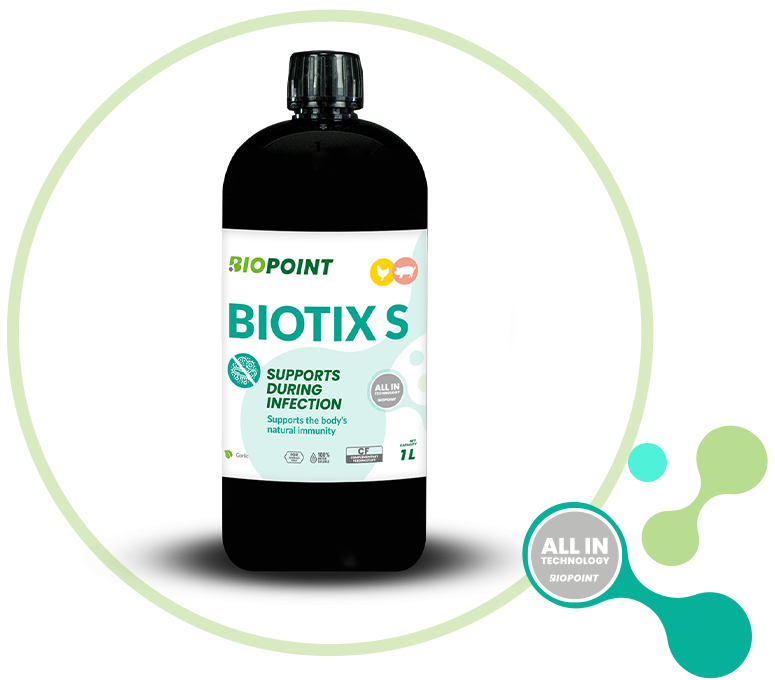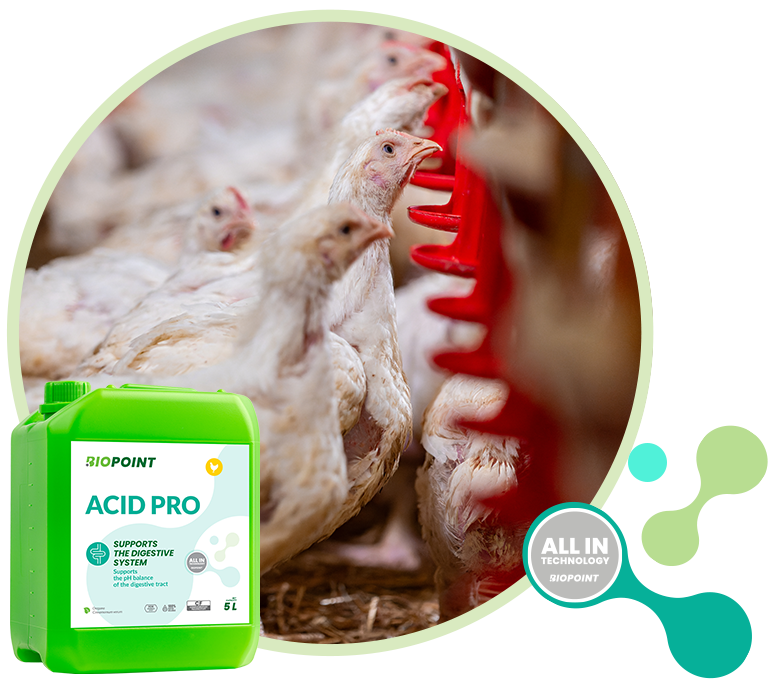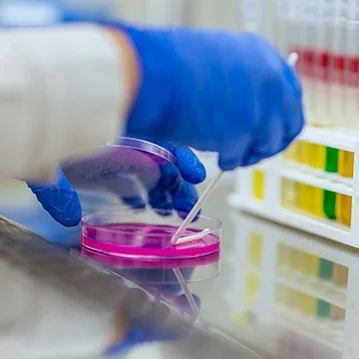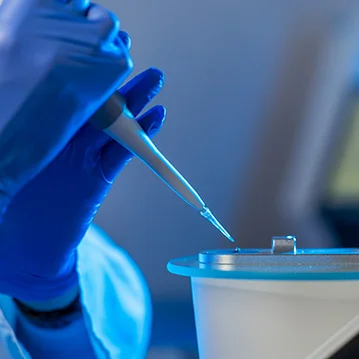Our best support
during an infection


Why use acidifiers?


Welcome
to BioPoint

The power of nature and technology for animal health



Support to reduce
the use of antibiotics

Support
for standard therapies
To further strengthen the condition of the herd, our products can be administered supportively during the use of pharmacological agents (however, they should not be combined in the same water).

The power of natural
phytoncide isolates
To ensure the effectiveness of the product, we create all our preparations with special care during the selection of raw materials and the technology used to obtain the active substances.

The power of nature
In the production process of our products, we rely mainly on herbs. These valuable plants contain unique substances, that we use to create innovative products with high concentration of active substances.
These substances come from selected and carefully chosen ingredients of natural origin, dedicated to solving specific problems, related to animal breeding.
The power of technology
It guarantees the quality, repeatability and durability of the product, enabling the standardization of production and maintaining the quality of products at a constant level, regardless of the batch. The herbal extracts obtained in this process offer high concentration of key active substances, enabling their synergistic effect.

Careful selection of raw materials
BioPoint's many years of experience show that a properly selected raw material guarantees the quality and effectiveness of the product, which is why we place such a high value on careful selection of raw material suppliers.Quality control of raw material
The High Performance Liquid Chromatography (HPLC) process allows us to select raw materials with the highest level of active substances.Extraction
We perform extraction using dedicated solvents, which, when combined with an appropriately selected processing temperature and stabilizers, guarantee the appropriate level of active substances.Microfiltration
At this stage, we filter out unnecessary substances that may clog the drinking lines and limit the activity of the product after opening.Reverse osmosis
The extract is concentrated many times to obtain the maximum content of active substances such as allicin, ajoene, diallyl disulfide. During the reverse osmosis process, the solvent that is unnecessary at this stage is also removed from the extract. This allows the maximum therapeutic dose of the product to be obtained.Standardization of active substances
Only extracts that, after microfiltration and reverse osmosis, contain minimal amounts of active substances specified in our recipe, pass to the next stage of production.Active herbal extract


Quality Assurance
Every material and finished product is tested by our qualified team in our modern laboratory. All products that we introduce to the market must meet specific quality standards included in the FAMIQS system.
This is the world's leading feed quality and safety management system for the speciality ingredients sector. In addition, the quality of our products is also confirmed by other certificates, such as GMP, ISO 9001 and QS.
Global nature
of the company
More than 20 years of experience and extensive knowledge, developed on the Polish market since 2002, have enabled us to successfully expand into international markets.
Currently, the high quality of our products is appreciated in over 40 countries around the world in Europe, Asia and the Middle East, supporting farmers and veterinarians in caring for animal health on a global scale.

BioPoint - feed additives, dietary and supplementary mixtures
At the heart of our mission lies the drive to minimize the use of antibiotics in animal breeding through the utilization of plant-based products. This initiative not only supports the health of animals but also aligns with global efforts towards sustainable agriculture practices. By integrating the latest technological advancements with the purest natural ingredients, we create feed additives that are both effective and environmentally friendly. Our approach ensures that farmers and veterinarians have access to superior products that promote the overall well-being of livestock without compromising on safety and efficacy.
Reducing Antibiotic Use with Natural Solutions
In the realm of animal husbandry, the overuse of antibiotics has long been a concern, primarily due to its implications for resistance build-up and overall animal health. BioPoint is at the forefront of addressing this issue by developing and promoting feed additives derived from natural sources. These products are not only safe but are also designed to enhance the animal's natural immune systems, thus reducing the need for antibiotics. Our solutions leverage the therapeutic properties of plants, which provide a holistic alternative to traditional chemical treatments, thereby supporting the health of the animal and the sustainability of farming practices.
The impact of antibiotics on animal health
The widespread use of antibiotics in animal farming has been a double-edged sword. While they effectively treat infections, their overuse can lead to antibiotic resistance, where harmful bacteria evolve to survive drug treatments. This resistance can transfer from animals to humans, posing significant public health risks. Moreover, excessive antibiotics can disrupt the natural gut flora of animals, leading to decreased efficiency in nutrient absorption and overall health. By understanding these impacts, BioPoint emphasizes the importance of reducing antibiotic use and exploring natural alternatives that maintain the health and productivity of livestock.
Feed additives as alternatives to antibiotics
At BioPoint, we champion the use of feed additives as viable alternatives to antibiotics. These additives include a variety of natural ingredients like herbs, spices, and probiotics, which have been proven to improve health and prevent disease naturally. By enhancing gut health and boosting the immune system, these additives reduce the need for antibiotics, thus lowering the risk of resistance build-up. Our continuous research and development in this area ensure that our products not only meet the needs of today’s farmers but also address the broader challenges of future animal health management.
Phytoncide Isolates: Harnessing the Power of Nature
Phytoncide isolates represent a groundbreaking advancement in the field of natural animal health solutions. These naturally occurring compounds, found in plants, have potent antibacterial and antifungal properties. At BioPoint, we harness these compounds to create feed additives that protect animals from infections and diseases without the need for synthetic chemicals. The use of phytoncide isolates in our products underscores our commitment to innovation and our belief in the power of nature to provide safe, effective solutions for animal health.
What are phytoncide isolates?
Phytoncide isolates are bioactive compounds produced by plants as a defense mechanism against pathogens. These substances have been scientifically recognized for their ability to inhibit the growth of bacteria and fungi, making them an excellent choice for natural health products. At BioPoint, we extract these isolates using advanced technologies to ensure their purity and potency. This not only maximizes their effectiveness but also guarantees the safety of our feed additives, providing a natural way to maintain animal health.
Benefits of phytoncide isolates in feed additives
The incorporation of phytoncide isolates into our feed additives offers numerous benefits. These include enhanced disease resistance in animals, improved feed conversion ratios, and a reduced reliance on chemical treatments. The natural antimicrobial properties of phytoncide isolates help in maintaining a balanced gut flora, which is crucial for optimal health and growth. By using these isolates, BioPoint’s products ensure that animals are not only healthier but are also more productive, thereby providing economic benefits to farmers while upholding our commitment to sustainability.
Advanced Production Technologies for Feed Additives
In the ever-evolving field of animal nutrition, BioPoint stands out for its commitment to integrating advanced production technologies. Our sophisticated processes ensure that every feed additive we produce meets the highest standards of quality and effectiveness. By utilizing cutting-edge technology, we can extract and preserve the most potent natural compounds, ensuring that our products provide maximum benefits to animal health. This approach not only enhances the efficacy of our feed additives but also supports sustainable practices in animal husbandry, aligning with global trends towards environmentally friendly farming solutions.
Overview of ALL IN TECHNOLOGY by BioPoint
ALL IN TECHNOLOGY is a patented production process developed by BioPoint, which guarantees the consistency and quality of our feed additives. This innovative technology ensures that each batch of product maintains the same high level of active substances, providing reliable results every time. The ALL IN TECHNOLOGY process involves precise extraction, concentration, and stabilization techniques that preserve the integrity of natural ingredients. By standardizing production, we can offer feed additives that are both effective and safe, supporting the health and productivity of livestock across various farming environments.
The importance of standardized production processes
Standardized production processes are crucial in the manufacturing of feed additives, as they ensure uniformity and quality across all products. At BioPoint, our commitment to standardization means that farmers can trust our products to perform consistently, regardless of when or where they are used. This reliability is achieved through meticulous quality control measures and state-of-the-art technology that monitors each step of production. By maintaining strict standards, we can provide feed additives that not only meet but exceed industry expectations, supporting animal health and enhancing farming efficiency.
Ensuring Quality and Safety in Feed Additives
Quality and safety are paramount at BioPoint, where every feed additive undergoes rigorous testing and quality control measures. Our modern laboratory facilities are equipped with advanced analytical tools that ensure each product meets our stringent criteria. We utilize techniques such as High Performance Liquid Chromatography (HPLC) to verify the concentration of active substances and ensure the purity of our ingredients. This comprehensive approach to quality control guarantees that our feed additives are safe, effective, and reliable, providing peace of mind to farmers and veterinarians who depend on our products.
BioPoint’s rigorous quality control measures
BioPoint's dedication to quality control begins with the careful selection of raw materials and extends throughout the entire production process. Each ingredient is thoroughly tested for purity and potency before it is used in our formulations. During production, we implement multiple stages of quality assurance to monitor the consistency and effectiveness of our feed additives. Our team of qualified professionals conducts regular audits and inspections to maintain our high standards. This rigorous approach ensures that every product we release is of the highest quality, supporting the health and well-being of animals.
Certifications and standards in feed additive production
BioPoint’s feed additives are produced in compliance with several internationally recognized standards and certifications, including GMP, ISO 9001, and QS. These certifications reflect our commitment to quality, safety, and sustainability in our production processes. Adhering to these standards ensures that our products are manufactured under stringent guidelines that prioritize the health of animals and the environment. Additionally, our adherence to the FAMIQS system, the world’s leading feed quality and safety management system, further demonstrates our dedication to producing top-tier feed additives that meet global benchmarks.